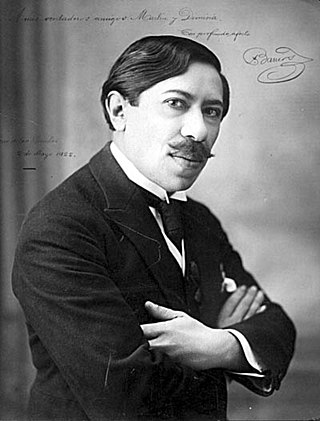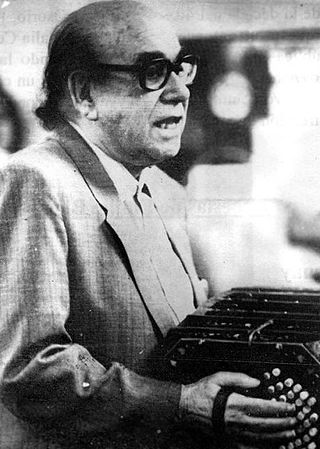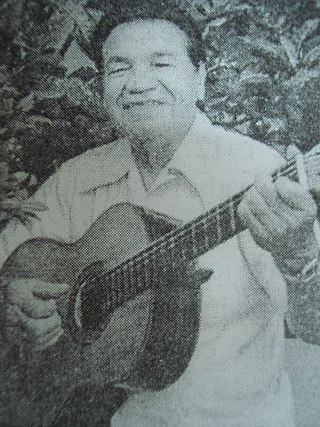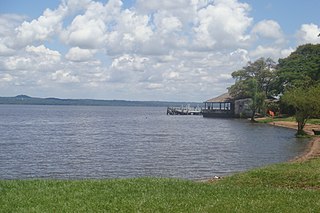
Polka is a dance and genre of dance music originating in nineteenth-century Bohemia, now part of the Czech Republic. Though associated with Czech culture, polka is popular throughout Europe and the Americas.
The music of Latin America refers to music originating from Latin America, namely the Romance-speaking regions of the Americas south of the United States. Latin American music also incorporate the Indigenous peoples of the Americas. Due to its highly syncretic nature, Latin American music encompasses a wide variety of styles, including influential genres such as cumbia, bachata, bossa nova, merengue, rumba, salsa, samba, son, and tango. During the 20th century, many styles were influenced by the music of the United States giving rise to genres such as Latin pop, rock, jazz, hip hop, and reggaeton.

Choro, also popularly called chorinho, is an instrumental Brazilian popular music genre which originated in 19th century Rio de Janeiro. Despite its name, the music often has a fast and happy rhythm. It is characterized by virtuosity, improvisation and subtle modulations, and is full of syncopation and counterpoint. Choro is considered the first characteristically Brazilian genre of urban popular music. The serenaders who play choros are known as chorões.

Agustín Pío Barrios was a Paraguayan virtuoso classical guitarist and composer, largely regarded as one of the greatest performers and most prolific composers for the guitar.
The folkloric traditional music of Paraguay is the Paraguayan polka and the Guarania. The Paraguayan polka comes from polka of Czech origin; that was danced for the first time in Asunción, on November 27, 1858. The guarania was created by the Paraguayan musician José Asunción Flores, in January 1925, after experiencing different arrangements with the old Paraguayan musical theme "Ma'erãpa reikuaase". Paraguay also has classical music and popular music consisting of rock and jazz music. The folk music uses a range of different instruments some of which include the Spanish guitar and the European harp.

Herminio Giménez was a Paraguayan composer.

The cinema of Paraguay has historically been small. However, this has begun to change in recent years with films like El Toque del Oboe (1998); María Escobar (2002); O Amigo Dunor (2005), which competed for Best Movie in the Rotterdam International Film Festival; Hamaca Paraguaya (2006), which was screened at the Cannes Film Festival, gaining critical acclaim both in Paraguay and abroad; 7 cajas (2012); Latas Vacías (2014); and Luna de Cigarras (2014).

Agustín Pío Barboza was a Paraguayan singer and composer.
Mauricio Cardozo Ocampo was the main reference of the so-called "golden generation" of the Paraguayan popular music and a strict studious of the Paraguayan folk music.
Félix Pérez Cardozo was a Paraguayan harpist.
Carlos Lara Bareiro was a Paraguayan classical musician, composer, and conductor. He was born on the March 6, 1914 to Juan Carlos Lara Castro and Lorenza Bareiro in Capiatá, Paraguay. He inherited the aptitude and vocation for music from his father and learned the basics of this art which he would then dominate.

Eladio Martínez was born in Paraguarí, Paraguay, on May 19, 1912, son of Lorenzo Martínez and Nicolasa Benítez. He belonged to a family of musicians. His father was a bandleader of a group formed entirely by his relatives in Villarrica.
Florentín Giménez was a Paraguayan pianist and composer.

The Ypacaraí Festival has been held in the city of Ypacaraí, Paraguay, since 1971, between August and September. It is a folklore festival organized with great emphasis on all kinds of cultural manifestations.
Juan Cancio Barreto is a Paraguayan musician.
Antonio Ortiz Mayans (1908–1995) was a Paraguayan writer and composer.

Oscar Nelson Safuán was a Lebanese-Paraguayan composer. He was the creator and developer of the music genre called Avanzada.
Felipe Sosa is a Paraguayan musician, guitarist, composer and teacher, from Caazapá, a city of the department with the same name in Paraguay. Throughout his career, Sosa recorded 21 albums, 2 of them with orchestras, and the rest as guitar solos. In Paraguay he is considered one of the main promotors of the music of Mangoré.
Emilio Bobadilla Cáceres (1907-1979) was a Paraguayan songwriter. He was born in Cerro Verá, in the town of Pirayú, Paraguay, on March 3, 1907. He was son of Ramón Bobadilla and Isabel Cáceres.









